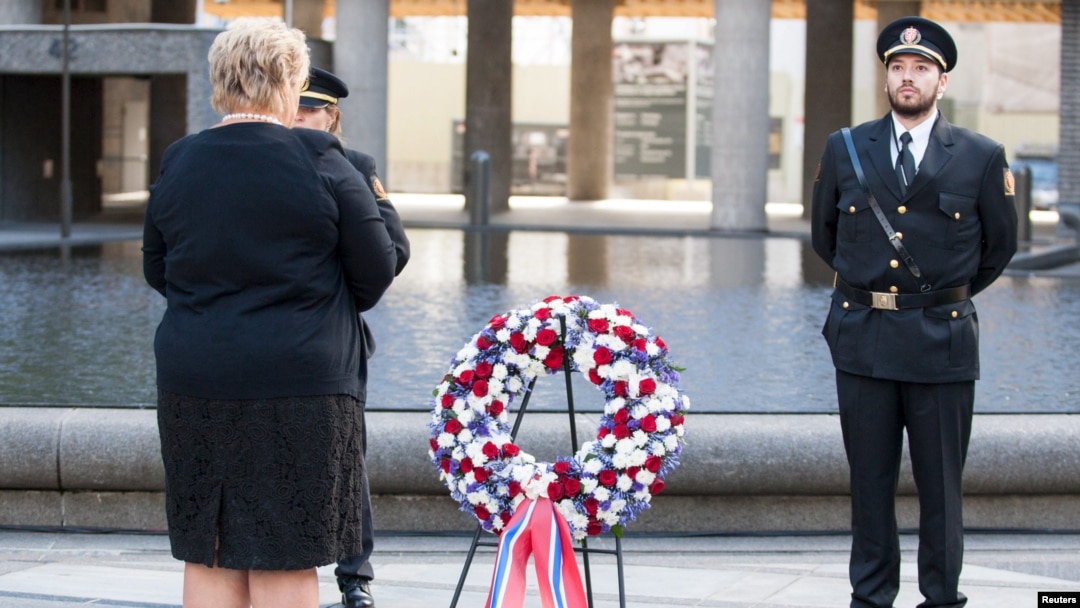On July 22, 2011, Anders Behring Breivik detonated a bomb in central Oslo, killing eight people, then took a boat to an island where the then-ruling Labor Party were holding a summer camp and shot dead 69 more people, mostly teenagers.
It was the worst massacre Norway had seen since World War Two.
Breivik, a right-wing anti-Muslim radical who accused the then-ruling Labour Party of allowing too much immigration, is serving a 21-year prison term, Norway's maximum sentence.
It can be extended if he is judged to be a threat at the end.
Earlier this month, Breivik, now 36, launched legal action accusing the Norwegian state of violating his human rights by keeping him in strict isolation in prison four years after he massacred 77 people.

Norwegian mass killer Anders Behring Breivik gestures as he arrives at the court room in Oslo Courthouse August 24, 2012.
The legal papers, filed with Oslo's main court and referring to the European Convention on Human Rights, were aimed at forcing Oslo to grant Breivik more access to other people and limit censorship of his letters.
'Extreme degree of isolation'
"He has a very extreme degree of isolation," Breivik's lawyer, Oeystein Storrvik, told Reuters, saying contact with other people was mainly with guards and health personnel.
"We mean that he has a right to have contact with other people," he said, perhaps including other prisoners despite risks that they might attack him. It will be up to the court to decide whether to allow his case to be heard.
In the capital, a planned exhibition about the killings is angering some Norwegians, who fear it will turn into a "hall of fame" for Breivik.
The exhibition, opening this week in the government building in central Oslo where Breivik killed his first eight victims four years ago, will include his fake police identity card and bits of the mangled van in which he planted a bomb.
Norway's Conservative-led government says the information center, likely to last five years, has been planned in consultation with some survivors and relatives to help the Nordic nation come to terms with the attacks.
But many want to forget Breivik.
"It's regrettable that the attacker is getting the attention he always sought," Tor Oestboe, whose wife was among those killed in Oslo, told Reuters.
FILE - From left, Norway's Prime Minister Erna Solberg, Labor Party leader Jonas Gahr Stoere, National Support Group's leader Trond Henry Blattmann and leader of Labor Youth of Norway (AUF) Eskil Pedersen lay wreaths on Utoya Island, July 22, 2014.
He said he saw a need for information but feared the exhibition and inclusion of personal items would provide a "hall of fame" for Breivik.
"July 22 is an open wound and it hurts, and I understand that it will be hard for many people to visit this exhibition," Minister of Local Government and Modernisation Jan Tore Sanner told Reuters.
"We cannot and should not forget this story. Knowledge is the most important instrument against hate, violence and extremism," he said, adding the attacks would be part of the education of children and future generations.
University admittance
Meanwhile, the University of Oslo reported Breivik has been admitted to the university's political science program, although he will stay in his cell to study.
“All inmates in Norwegian prisons are entitled to higher education in Norway if they meet the admission requirements,” university rector Ole Petter Ottersen said last week.
Breivik's application was rejected two years ago after the university said his qualifications were insufficient.
That submission stirred a debate in Norway over whether someone convicted of such a horrific crime should be considered for higher education.
Norway has a rehabilitation-focused justice system aimed at helping inmates prepare for life after they get out, which includes giving them the right to pursue higher education.
Before the 2011 attacks, Breivik attended high schools in Norway and took online course in small-business management. But he had not completed secondary education, which he has been working on since his 2012 conviction.
“He then didn't meet the admission requirements. Now his grades live up to what is expected,” university spokeswoman Marina Tofting said.
Breivik will begin the university program in August.
Study in cell
Prison regulations will prevent him from going to the Oslo campus, attending classes, accessing digital learning resources or having any contact with students or university staff, Ottersen said.
“It is important to us that he remains in his cell,” Lisbeth Kristine Roeyneland of the victims' support group told Norwegian news agency NTB. “To us, it is irrelevant whether he sits there and reads fiction or whether he is studying a book of political science.”
Hours before the attacks, Breivik emailed a 1,500-page, anti-Muslim manifesto, citing counter-jihadist groups who have condemned his actions and dismissed him as a lunatic. Breivik also claimed to be part of a secretive, non-existent network of “Knights Templar.”
Material for this report also came from AP.


